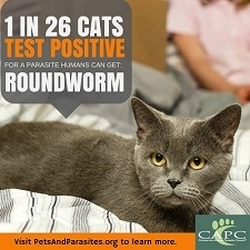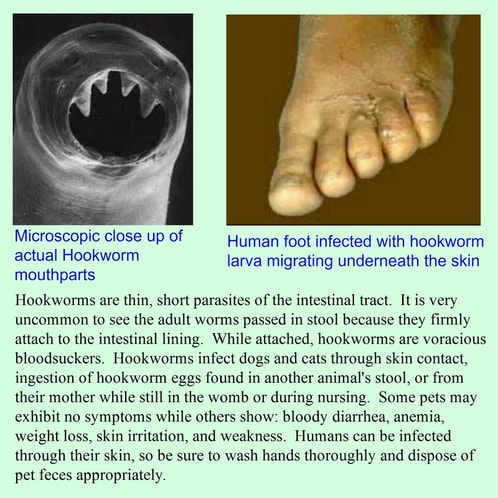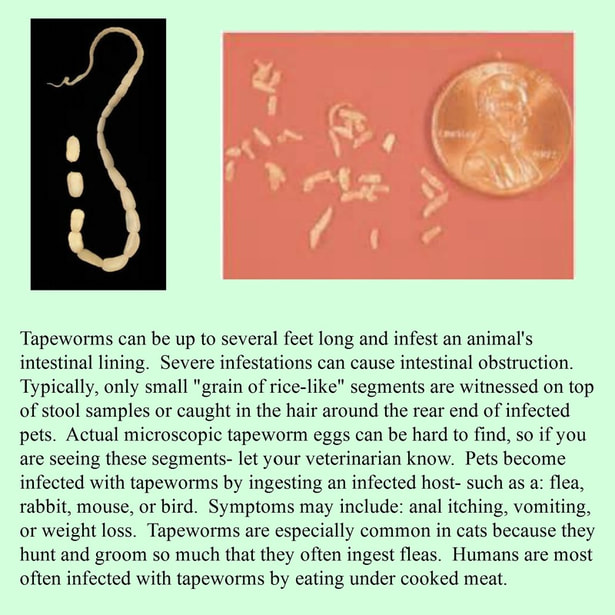Intestinal Parasites of Pets
***Many of these are transmissible to people***
Hookworms
Hookworms are intestinal parasites of both cats and dogs- and can infect humans also! The adult hookworms are rarely seen in stool as their hook-like mouthparts keep them anchored inside the intestine. Hookworms are hardy bloodsuckers and can cause severe anemia or death in young pets. Symptoms may also include: stunted growth, poor haircoat, diarrhea, pale gums, and dehydration. Pets become infected with hookworms through the placenta from infected mothers, through infected mother's milk during nursing, by fecal-oral transmission of the microscopic eggs, or ingestion of another infected host (usually a rodent). Hookworms can also penetrate skin- which is a common problem for humans who walk barefoot or perform gardening work in contaminated soil. Have your pet's stool sample analyzed by your veterinarian at least annually to look for the presence of microscopic eggs! Visit https://www.capcvet.org/guidelines/hookworms/ for more information.
Hookworms
Hookworms are intestinal parasites of both cats and dogs- and can infect humans also! The adult hookworms are rarely seen in stool as their hook-like mouthparts keep them anchored inside the intestine. Hookworms are hardy bloodsuckers and can cause severe anemia or death in young pets. Symptoms may also include: stunted growth, poor haircoat, diarrhea, pale gums, and dehydration. Pets become infected with hookworms through the placenta from infected mothers, through infected mother's milk during nursing, by fecal-oral transmission of the microscopic eggs, or ingestion of another infected host (usually a rodent). Hookworms can also penetrate skin- which is a common problem for humans who walk barefoot or perform gardening work in contaminated soil. Have your pet's stool sample analyzed by your veterinarian at least annually to look for the presence of microscopic eggs! Visit https://www.capcvet.org/guidelines/hookworms/ for more information.

Roundworms
Roundworms are intestinal parasites that are very common in both cats and dogs (especially kittens and puppies). Pets become infected with roundworms either during pregnancy (the roundworm larvae can cross the placenta into the kittens/puppies before they are born), during nursing (roundworm larvae can be passed from mother to baby in the milk), ingestion of the microscopic roundworm eggs (fecal-oral transmission), or by ingesting another host (eating a mouse or rabbit for example). Newer research has shown that indoor bugs (cockroaches, houseflies, and crickets) may also transmit intestinal parasites. 15% of commercial potting soil also contains roundworm eggs! Roundworms swim inside the intestines; robbing pets of their nutrition, and can also migrate through the lungs in young animals. Symptoms of roundworms may include: long "spaghetti noodle-like" worms in the stool, a pot-bellied appearance, poor haircoat or stunted growth, diarrhea, mild cough, or vomiting. Heavy worm infestation can cause intestinal blockage and death in young kittens/puppies. Roundworms are a zoonotic disease- they can be passed to people from infected pets- young children are especially at risk! Roundworm larvae can migrate to the eyes in humans causing inflammation of the retina and blindness. Visit https://www.capcvet.org/guidelines/ascarid/ for more details.
Roundworms are intestinal parasites that are very common in both cats and dogs (especially kittens and puppies). Pets become infected with roundworms either during pregnancy (the roundworm larvae can cross the placenta into the kittens/puppies before they are born), during nursing (roundworm larvae can be passed from mother to baby in the milk), ingestion of the microscopic roundworm eggs (fecal-oral transmission), or by ingesting another host (eating a mouse or rabbit for example). Newer research has shown that indoor bugs (cockroaches, houseflies, and crickets) may also transmit intestinal parasites. 15% of commercial potting soil also contains roundworm eggs! Roundworms swim inside the intestines; robbing pets of their nutrition, and can also migrate through the lungs in young animals. Symptoms of roundworms may include: long "spaghetti noodle-like" worms in the stool, a pot-bellied appearance, poor haircoat or stunted growth, diarrhea, mild cough, or vomiting. Heavy worm infestation can cause intestinal blockage and death in young kittens/puppies. Roundworms are a zoonotic disease- they can be passed to people from infected pets- young children are especially at risk! Roundworm larvae can migrate to the eyes in humans causing inflammation of the retina and blindness. Visit https://www.capcvet.org/guidelines/ascarid/ for more details.
Tapeworms
Tapeworms are flat, segmented intestinal parasites that can affect dogs and cats. Pets get tapeworms by ingesting an infected rabbit, mouse, bird, or flea (intermediate hosts). Newer research also suggests that indoor bugs can transmit some intestinal parasites as well (cockroaches, houseflies, and crickets). Symptoms of infection may include: segments of the tapeworm caught in the hair around the pet's rear end or passed on top of a bowel movement, weight loss, excessive licking at the anus, or scooting hindquarters across the floor. Treatment consists of deworming medication and consistent flea prevention. Humans can also get tapeworms, but are more commonly infected by ingesting undercooked meat. For more information, visit: https://www.capcvet.org/guidelines/taenia/ or https://www.capcvet.org/guidelines/echinococcus-spp/
Tapeworms are flat, segmented intestinal parasites that can affect dogs and cats. Pets get tapeworms by ingesting an infected rabbit, mouse, bird, or flea (intermediate hosts). Newer research also suggests that indoor bugs can transmit some intestinal parasites as well (cockroaches, houseflies, and crickets). Symptoms of infection may include: segments of the tapeworm caught in the hair around the pet's rear end or passed on top of a bowel movement, weight loss, excessive licking at the anus, or scooting hindquarters across the floor. Treatment consists of deworming medication and consistent flea prevention. Humans can also get tapeworms, but are more commonly infected by ingesting undercooked meat. For more information, visit: https://www.capcvet.org/guidelines/taenia/ or https://www.capcvet.org/guidelines/echinococcus-spp/


